|
|
|
Sort Order |
|
|
|
Items / Page
|
|
|
|
|
|
|
| Srl | Item |
| 1 |
ID:
128808
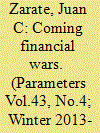

|
|
|
|
|
| Publication |
2013-14.
|
| Summary/Abstract |
Since 9/11, the United States has waged a new brand of financial war against rogue regimes, terrorist groups, and criminal syndicates. By leveraging American global economic predominance, the US has isolated such actors from the financial system. The domain of financial warfare, however, is now no longer the sole province of the US and presents challenges from enemies and competitors.
|
|
|
|
|
|
|
|
|
|
|
|
|
|
|
|
| 2 |
ID:
110158
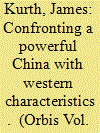

|
|
|
|
|
| Publication |
2012.
|
| Summary/Abstract |
The rapid rise of Chinese economic and military power has produced the most fundamental change in the global system since the end of the Cold War, and it poses vital questions about China's future direction. Many Western analysts argue that China's great power will cause it to become more like the West, i.e., like Western great powers. Other Western analysts believe that China will continue to be the same, i.e., like the China of the past few decades. An alternative interpretation, however, is that China's new power will enable it to become even more Chinese than it is now, i.e., to become more like the traditional and imperial China that existed before the Western intrusions of the 19th century. This China was the "Central State" of a distinctive Chinese world order, operating with distinctive conceptions about diplomatic relations, military strategy, and economic exchange. However, the new China will be unlike the old China in at least two important ways. It will be a naval, and not just a land, power, and it will be a financial, and not just a trading, power. In other words, it will be a powerful China with Western characteristics. As a formidable naval and financial power, China will present fundamental challenges to the United States and to both the long-standing U.S. security order in the Western Pacific and the long-standing "Washington Consensus" about the global economic order.
There was once a great power, one so great that its power not only reached all around the world, but it was recognized as the world's leading power. Its economic practices, political system, and conceptions of international law provided the models and set the standards for numerous other powers. And at the core of its power, and backing up its models, was a special form of military power-the greatest navy in the world-and a special form of economic power, the greatest financial system in the world. That great power was Great Britain, that navy was the Royal Navy, that financial system was centered in the City of London, and that era was just a century ago. However, the greatness of British power had been established almost a century before that, after Britain's victory in the Napoleonic Wars. That victory had largely been won with the advantages provided by the Royal Navy and the Bank of England.
|
|
|
|
|
|
|
|
|
|
|
|
|
|
|
|
| 3 |
ID:
055019
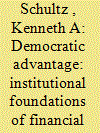

|
|
|
| 4 |
ID:
133810
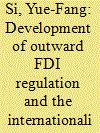

|
|
|
|
|
| Publication |
2014.
|
| Summary/Abstract |
The Investment Development Path (IDP) model has been widely accepted for illustrating the relationship between the inward and outward foreign direct investment (FDI) positions of a country and its economic status based on the data from developed economies. In recent years, however, outward FDI from developing economies has increased dramatically and it has been argued that institutions are 'forefront' factors in addition to the economic index. In this article, we use statistical data from China, which has gone through dramatic regulation reform and FDI development, to test the validity of the IDP model. We also trace the history of Chinese FDI regulation development to answer the following question: in what way are regulations important for FDI in different periods? We use Lenovo as a case study to show how a Chinese firm 'avoids' and 'adapts to' regulation changes. We find that the FDI development of China still follows the IDP model; however, the Chinese government has accelerated the whole process through active regulation reform. In a transition economy such as China, FDI co-evolves with the regulation, and the firms which can influence or foresee the policy changes can prosper considerably.
|
|
|
|
|
|
|
|
|
|
|
|
|
|
|
|
| 5 |
ID:
133809
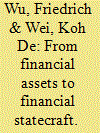

|
|
|
|
|
| Publication |
2014.
|
| Summary/Abstract |
Over the past few decades, China has accumulated over US$3.4 trillion of official foreign exchange reserves as it rises to become a global power. Do China's financial assets increase its ability to pursue its national interests internationally? With the globalisation and rising influence of Chinese state-owned enterprises, state-owned banks and sovereign wealth fund, as well as China's growing clout in several regional groupings, it is clear that China does possess the necessary mechanisms to assert its financial power. This article examines the efficacy and limitations of these mechanisms in Africa and Latin America, in the economic and political domains. In the economic domain, China has consistently used foreign oil contracts and acquisitions to secure direct oil flow from developing nations. An analysis of recent cases shows that while China is able to successfully harness its financial power in its pursuit of oil, it needs to fulfil its promises to the satisfaction of the recipient countries in order to maintain the value of its offers. In the political domain, China has used its financial assets to purchase diplomatic allegiance from various African and Latin American countries in support of its One-China policy. Studying both successful and unsuccessful cases reveals that while China is generally able to use its financial power in third-world countries against Taiwan successfully, its national goals have, in recent years, shifted to the economic realm, even with countries that still recognise the Taipei government.
|
|
|
|
|
|
|
|
|
|
|
|
|
|
|
|
| 6 |
ID:
160426
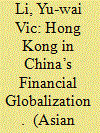

|
|
|
|
|
| Summary/Abstract |
This article casts new light on the role played by post-handover Hong Kong in China’s financial globalization. The power of the city’s markets aside, Hong Kong possesses critical political leverage that has facilitated Beijing’s liberalizing of its domestic capital market and its projection of international financial power.
|
|
|
|
|
|
|
|
|
|
|
|
|
|
|
|
| 7 |
ID:
171247
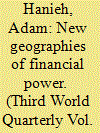

|
|
|
|
|
| Summary/Abstract |
A growing body of critical scholarship has examined the recent growth of Islamic finance (IF), unpacking its ethical assertions and highlighting its close affinities with conventional financial instruments. Receiving less attention, however, is the relationship between the global expansion of IF and the emergence of new financial actors and zones of accumulation. This article situates the evolution of global Islamic circuits alongside processes of capital accumulation in the Gulf Cooperation Council (GCC), arguing that contemporary IF is deeply bound up with the internationalisation of capital groups headquartered in the GCC. This is evident in the internationalisation of GCC Islamic banks, which has given the Gulf a powerful foothold in new markets and a variety of sectors that are typically considered ‘non-financial’. Simultaneously, the expansion and geographical diversification of Islamic debt (sukuk) issuance is refashioning the Gulf’s relationships with other global spaces, a process that looks set to intensify given the widespread push to utilise IF in development financing. Seen from this perspective, the global growth of IF sits in a mutually constitutive relationship with patterns of capital accumulation in the Gulf, as well as the region’s burgeoning weight within (and new linkages to) the global economy.
|
|
|
|
|
|
|
|
|
|
|
|
|
|
|
|
|
|
|
|
|